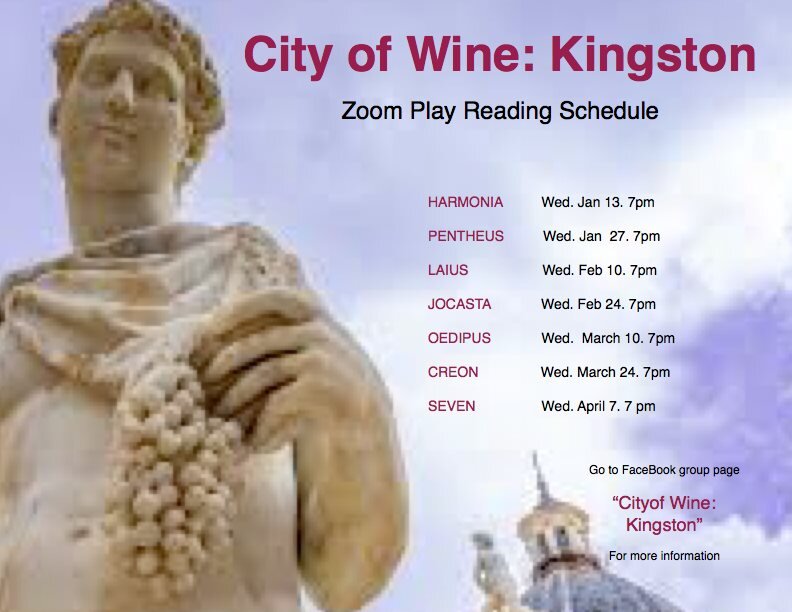Kingston Thespians Miraculously Unite for City of Wine Readings

When Ontario went into a full lockdown in late December, the prospect of theatre, even digital, seemed far-fetched. Yet, in the midst of uncertainty and anxiety from the lockdown, something beautiful happened for Kingston’s small, but mighty theatre community.
On December 27th, a Facebook group titled City of Wine: Kingston, was created. City of Wine is a seven-part play by famed Canadian playwright and Kingston resident Ned Dickens, that showcases the evolution of Thebes, an ancient Greek city. As one of the first posts by Dickens states, “This is not a performance. You don’t need to be an actor… The big idea is to see if we can generate some energy for this uber huge project right here in Kingston and maybe, some day, actually stage the whole damn thing here.”
Yet, what easily could have been a wholesome one-time read-through morphed into something beyond extraordinary. Currently, the group has almost 200 members, which is absolutely remarkable. City of Wine: Kingston has already facilitated two virtual read throughs, with Harmonia on January 13th and Pentheus on January 27th. Amazingly, the remaining five cycles are all scheduled to take place between now and April. I had the privilege of watching a Zoom recording of Harmonia and attending the (virtual) reading of Pentheus.
Fascinated by how a Facebook group could transform into a phenomenal virtual community for Kingston thespians, I chatted with Dickens about City of Wine, virtual theatre, and the power of storytelling. Curious about the initial inspiration that prompted this virtual community, Dickens explained that “I just thought, well, let’s just do this. Let’s use it to build the base of the community, just to start the process of getting enough people who’ve read the play, who are enthusiastic about the idea of the project, who can begin to grasp the scale of the thing.” He furthers this by stating “one of the mantras of this project is that it takes a city to play a city.”
One fabulous aspect of these City of Wine readings is how incredibly accessible they are. Dickens said this was a conscious choice, and elaborated by explaining that “When we did Harmonia, we had people ranging from like, Sarah Stanley, who started the whole thing 25 years ago… and some of whom have never done anything like this before in their lives. Some are local theatre people, some are Queen’s students.” In fact, I would argue that the range of expertise in the readings made it even more engaging. It wasn’t just about diving into the scripts, but rather establishing a community of like-minded folks, regardless of level of experience.
However, it is crucial to understand that these readings truly are just meant to be preliminary. Dickens hopes that “when we do make our move to do this, by whatever means, that the awareness is already out there.” Dickens points out that navigating digital theatre and logistics of Zoom would not have been possible without the help of his stage manager, Grace Irwin. Dickens was connected with Grace through Siobhan McMahon, who had auditioned and played the title role in Icara, a recently produced play of Dickens last year in Kingston. He explains that to an extent, these preliminary readings work to “just help as many people as possible, get through this year. It’s just a thing to do, to meet other people and believe that theater is alive in Kingston.”
After connecting with Siobhan, Ned reached out to some Kingston theatre people to consult on this seed of an idea. “I just kind of spilled out the bigger picture and I got their feedback. And then the original idea was to get seven people, and I get each of them to find seven people through their networks, and we get 49 people. And then each of those people did two plays.” He reluctantly explained that it was the Facebook group that set it all off: “The Facebook group was explosive. And we just got up there.”
Dickens also was extraordinarily conscious of his own role as a leader in facilitating this community. He consistently will post in the Facebook group explaining that he wants to democratize the community and take on less of a leadership role. He says,“This is already way too much about me. Right? I mean, I’ve already told everybody what to say and what to do and all plays like that’s kind of enough control for one straight white middle aged male… But I want the membership to elect the cast of the last play… Probably at some point, there will be some tension between me not letting go fast enough… I’m fascinated by all that stuff.”
Despite the success of the City of Wine readings, Dickens still feels that digital theatre is inherently limited. He explains, “Theatre is unmediated. Theatre is a very specific thing. And it’s something that I do… But theatre for me is live and immediate. When we say it’s immediate, I mean, it’s literally there.” In this sense, he feels that Zoom is not able to replicate the sensation of live, physical theatre. However, as I’m sure the entirety of the City of Wine community would argue, digital theatre is absolutely better than no theatre in these times.
Perhaps one of the most impressive facets of City of Wine was Dickens’ commitment to casting choices. He explains that in Pentheus, the second installment of City of Wine, is Tiersias, a non-cisgendered character, arguably one of the most famous non-cisgendered characters in Greek Mythology. Dickens was insistent on casting a non-binary or non-cisgendered performer for the role, and fortunately succeeded. Furthermore, City of Wine consists of a few gay characters and similarly, Dickens felt strongly about gay performers being cast in those roles. Dickens explained that as a playwright, “I only assign a gender to a character if I really feel I need it, you know, and it’s interesting to write romantic scenes. And to just deliberately avoid any indication of gender, I might have in my own mind because I can’t ultimately escape my own prejudices or perceptions.”
In terms of the readings themselves, I can wholeheartedly say that they were some of the purest and most wholesome virtual communities I’ve ever had the pleasure of being a part of. During the Zoom reading for Pentheus, two Kingston women who hadn’t seen each other in ages, adorably caught up through Zoom, proving the effect that this virtual community has been able to create. As well, Grace did a fantastic job of going over Zoom basics to everyone, again making the event incredibly accessible. Again, it wasn’t a polished read-through, there were technical difficulties here and there, but that’s besides the point of these readings. It was evident that all readers were thrilled to engage with theatre in the midst of a lockdown, and as an audience member, just to revel in their joy was beyond heartwarming.
More than anything else, City of Wine proved the strength of Kingston’s theatre community. Even in the midst of a literal lockdown, these individuals found a way to virtually unite over a shared passion for the theatre. I only look forward to watching City of Wine: Kingston continue to blossom, in whatever iteration that maybe. But for now, let’s continue to engage with theatre safely and virtually.
For more information on City of Wine: Kingston, including upcoming shows, check out the Facebook group.
